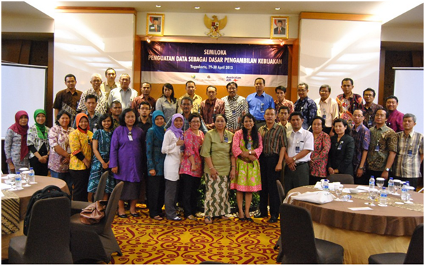Strengthening Data as a Basis for Policy Making
Saturday, 04/05/2013Yogyakarta
Held at the Ros-In Hotel Yogyakarta on Tuesday, April 30, 2013, SurveyMETER presented a regional seminar with the theme "DATA STRENGTHENING AS A BASIS FOR POLICY MAKING". This seminar also serves to disseminate the results of the Data Based Policy Study, which was carried out in 21 districts/cities throughout three provinces (East Java, DIY, and Central Java) in February and March 2013. The Asia Foundation's partnership with SurveyMETER and AusAID made the study possible.
Participants in the seminar included academics and policy practitioners as well as stakeholders from 16 survey sample districts/cities, each represented by two SKPDs, notably Bappeda and the Education Service or Health Service. This seminar is regarded as an extremely important forum for facilitating the sharing of research findings, discussions of concepts, ideas, and perceptions of bolstering data as capital for decision-makers from a range of stakeholders.
This seminar served as a forum for the following material agenda items: Dani Alfah, S.Sos., MPA, SurveyMETER researcher, presenting study results; Ir. Sutrisno MES, Chair of the Regional Research Council of Sleman Regency, DIY Province, discussed the experience and dynamics of regional government in data-based policy making; Dr. Gabriel Lele, a postgraduate lecturer at UGM Yogyakarta, discussed and shared strengthening data as a fundamental basis for preparing development planning within the framework of the regional autonomy agenda; and Dra. Suci Iriani Sinuraya from Bappeda Sleman Regency, shared data sharing and discussion.
Dani Alfah clarified in his presentation how the study's findings offered fresh insights and research on bolstering and utilizing data in policymaking from five perspectives: data sources, data collection, data quality, data analysis, and decision-making. This study comes to the conclusion that while districts and cities have employed data in the process of creating or implementing policies, they continue to prioritize the use and source of data over data quality. Furthermore, there is still little contribution from the dimensions of data quality, data analysis, and diversity of data collection methods. According to Dani, the study's findings urge employing independent and local data in both quantitative and qualitative research, as well as varying data gathering techniques and enhancing data quality at the regional government's SKPD level.
According to Gabriel, local data in one place may serve as a counterbalance for national statistics. Frequently, national data from data institutions used by the government is erroneous. Updating data is another major issue facing this national data institution; its legitimacy and dependability need to be verified once more. "So, the regions have a significant task ahead of them in gathering and evaluating data for policy purposes," said Gabriel.

According to Sutrisno's experience, regional governments require precise information throughout the formulation phase in order to make policy decisions. Accountability will be made simpler and implementation issues will be reduced as a result. Sutrisno concluded his presentation by saying, "Without correct statistical data, we are like catching a black cat in a completely dark room."
All participants in this semi-workshop were eager to participate in the various semi-workshop activities till the end of the session. Several conclusions were made when the discussion session's results were presented. The goal of a decent government should, in theory, be in line with the goals of the community, and data-driven policies should represent the conscience of the people. Going back to statistics, this is where the public's complaints of falsehoods and the government's technocratic planning meet.
Members of the seminar concluded by recommending the formation of a data care network and a mailing list. When attempting to spread this mentality to nearby districts and cities, they hope that the celebration of data can continue in each of their individual districts and cities. (JF)